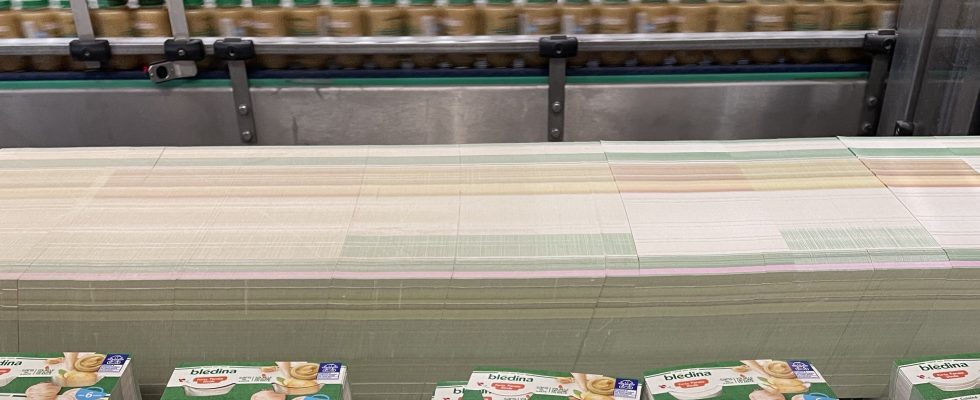The pace is hellish. Through the windows, we can see a continuous ballet of small glass jars filled to the nearest hundredth of a second, in a cloud of steam, with a carrot-colored puree – the most used food, associated with potatoes or even parsnips. The containers arrive at the line – 720 per minute – via an automated rail located high up, before entering a giant boxing machine, inaugurated fifty years ago almost to the day. The age of the Blédina factory in Brive, in Corrèze, which houses this old machine, certainly, but very valiant. More than 500,000 baby food jars come out every day to fill the shelves of supermarkets and pharmacies in France.
Each product is carefully checked by state-of-the-art machines capable of analyzing the contents and detecting the presence of possible pieces of glass instantly. A high requirement to meet strict specifications. “We have research teams working on the nutritional composition of our products, because we are certainly talking about a small pot, but there is a lot of science involved,” explains François Eyraud, the French general manager of Danone, owner of the Blédina brand. The nutritional needs of babies change very quickly in the space of thirty-six months. We have an obligation to offer them the best, which requires a great deal of intelligence, both medical and technical.”
A study on the economic, social and environmental impact
Fifty years old but in tune with the times, the Brive site has undergone an impact study, both economic, social and environmental, on the scale of its territory. A way to ward off possible attacks, but also to be self-critical. A firm was commissioned to measure the impact of its activity, by surveying stakeholders. Volvic has taken the same approach, as has Danone Pays de Bray, whose factory – the group’s largest in France – is located in Ferrières-en-Bray, in Normandy. “We wanted to get feedback from the people we work with: to know how they perceive us, to determine our strengths and weaknesses,” explains François Eyraud.
The restitution of the first study took place on September 22, in the presence of various local stakeholders. It appears that the Blédina site is an economic engine for the Corrèze region. “It is an exemplary company, not necessarily the most visible, but which, on all sides, will make the effort to improve in the social field with working conditions recognized as very good and which pull the territory towards the top”, illustrates Margault Phélip, partner at Archipel & Co. To achieve this result, this consulting firm conducted “extensive” interviews with associations, elected officials and even farmers who supply Danone. The Blédina site is also working on its water consumption – halved since 2010 – and its carbon footprint. He must now set an example. “Local players ask us to share our best practices. Our relationship with farmers and our suppliers would make it possible to give others ideas to go faster and further,” adds the France general manager.
One of Danone’s apple suppliers was invited to speak on site. The opportunity to sign a “contract for the future” with him to help him in his transition to more sustainable agriculture. Problem is, this operator is not from the region, but from Montpellier. A choice that seems contradictory with the group’s discourse. “We can’t throw stones at them, far from it, but I think there is progress to be made. We need to reopen the discussions and for the Chamber of Agriculture to get a little more involved with three or four farmers local”, recognizes Frédéric Soulier, the mayor of Brive. However, Danone is convinced of this: “Without agriculture, there is no agri-food industry and without us to transform the products, farmers cannot find their outlets either,” assures the director of the factory, Pascal Sagot. A link that still needs to be consolidated, for a company that claims to be “multilocal” rather than multinational.
